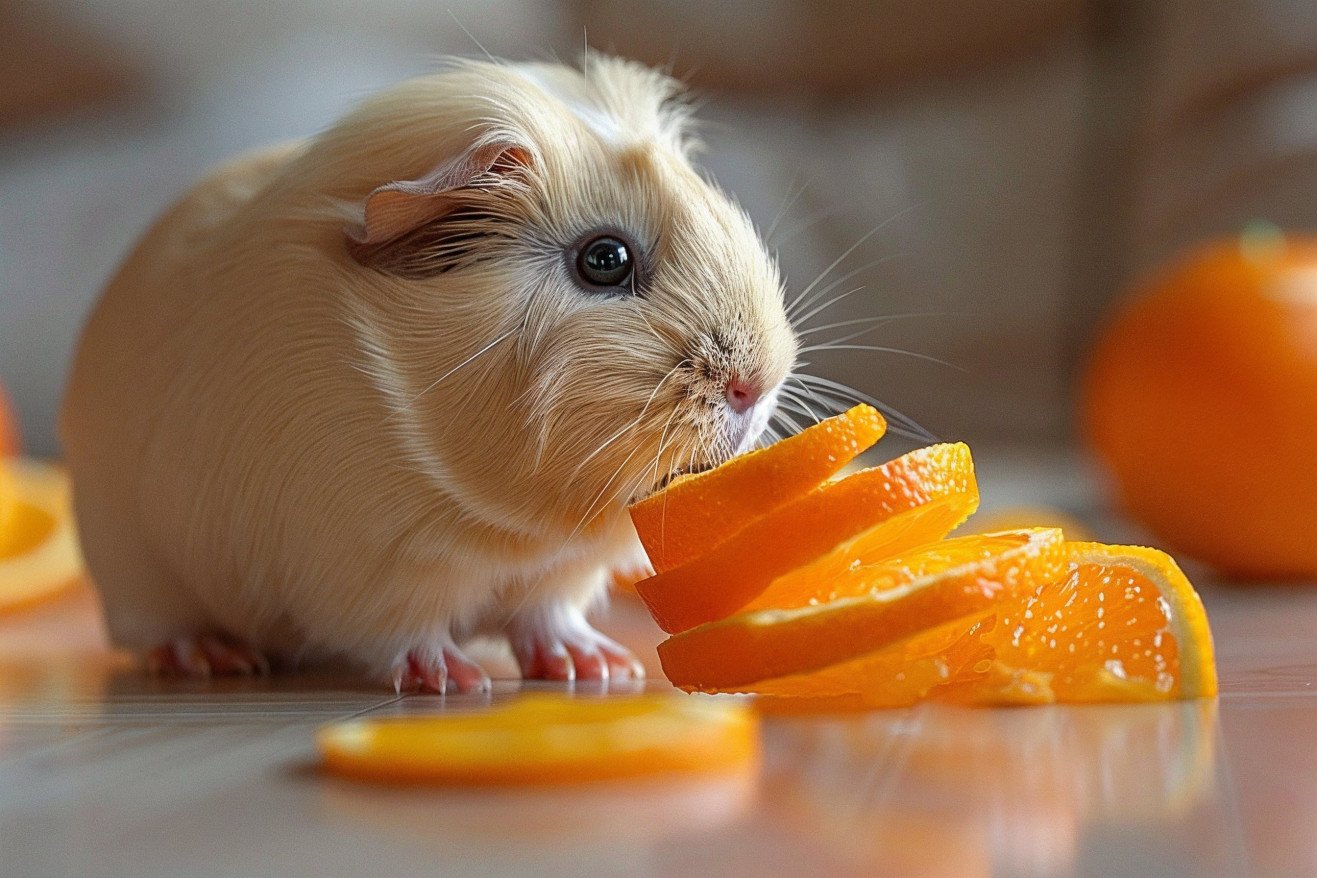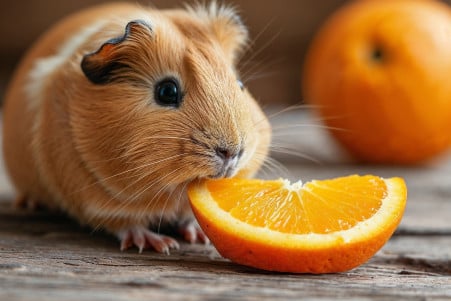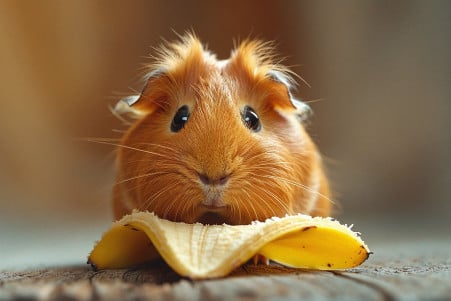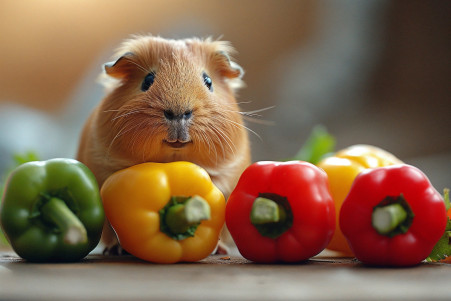Can Guinea Pigs Eat Orange Peels? A Look at Safe Snacks
8 April 2024 • Updated 8 April 2024

Guinea pigs can eat the flesh of an orange, but you may be curious if they can also eat the peel. Guinea pigs should not eat orange peels because they are hard to digest and can lead to gastrointestinal problems. Orange peels are low in nutritional value and high in oils that are hard for guinea pigs to digest.
We'll discuss the specific dietary requirements of guinea pigs and why certain foods, including orange peels, can be bad or even harmful for them. We'll also discuss which fruits and vegetables are good for guinea pigs to eat and how to introduce new foods to your guinea pig based on information from veterinarians and guinea pig owners.
Can guinea pigs eat orange peels?
Guinea Pig Diet
Guinea pigs are herbivores with a digestive system that is different from other rodents. This means their diet needs to be high in fiber and made up of plant-based foods. According to the RSPCA, guinea pigs should be fed unlimited hay or grass with a small portion of fresh vegetables, a small amount of pellets, and the occasional fruit.
One of the most important things to remember about guinea pig nutrition is that guinea pigs can't produce their own vitamin C. As the PDSA explains, a lack of vitamin C can lead to scurvy, so it's important to make sure that guinea pigs are fed foods that are high in vitamin C, such as bell peppers, kale, and citrus fruits. The RSPCA also suggests feeding leafy greens and weeds daily as they are excellent sources of vitamin C.
Guinea pigs can have digestive issues if new foods are introduced too quickly or if they are fed the wrong types of foods. This is why it's important to be mindful of their digestive systems and make sure that they are getting enough fiber, as the PDSA explains. This is especially important when you consider that guinea pigs can't produce their own vitamin C. Knowing this information can help you make sure that you are feeding your guinea pigs the right foods and avoiding things like orange peels.
What Fruits Can Guinea Pigs Eat Safely?
In addition to oranges, there are many other fruits that guinea pigs can eat as an occasional treat in small amounts. The Humane Society of the United States lists fruits that are safe for guinea pigs to eat as including strawberries, blueberries, melons, kiwi, and small amounts of banana and apple.
Fruits should be washed and any seeds, pits, or peels should be removed before being given to guinea pigs. As Small Pet Select points out, fruits are high in natural sugars, so they should be a small part of a guinea pig's diet, which should be made up primarily of hay and vegetables.
As the Southern California Guinea Pig Rescue notes, it's important to introduce new fruits slowly and watch for any signs of digestive upset when you're adding new foods to your guinea pig's diet. However, with these caveats in mind, guinea pigs can eat a number of fruits safely and enjoy them as part of a healthy diet.
Vitamin C: An Important Nutrient for Guinea Pigs
Guinea pigs are one of the few mammals that can't synthesize their own vitamin C, so it's an important part of their diet. In fact, PetMD explains that vitamin C deficiency, or scurvy, can cause a number of health problems including lethargy, joint pain, dental issues, and even respiratory distress if it's severe enough.
The recommended daily allowance for guinea pigs is 10-30 mg/kg, and this can be met through vitamin C-containing fruits and vegetables such as bell peppers, kale, and citrus fruits, according to Vet Help Direct. However, GuineaDad notes that guinea pigs that don't get enough vitamin C from their diet may need to be given vitamin C tablets or fortified pellets.
Because of this, it's important to watch for signs of scurvy and make sure that guinea pigs always have a reliable source of vitamin C. Pet parents who are aware of their pets' special vitamin C requirements can make sure that they don't develop this painful condition and that they stay healthy and content.
How to Create a Healthy Diet for Your Guinea Pig
A healthy diet for guinea pigs will include unlimited high-quality hay or grass, as the Guide to a Balanced Diet for Guinea Pigs explains. This should be supplemented with daily servings of fresh vegetables and a small number of pellets, according to What Can Guinea Pigs Eat: Daily Dietary Needs.
It's important to make sure that your guinea pig's diet is well-rounded, so make sure to rotate the leafy greens, vegetables, and occasional fruits that you give them to ensure that they get a variety of nutrients, as suggested by Guinea Pigs Australia. In addition, you should always introduce new foods slowly and watch for any signs of digestive upset when you change your guinea pig's diet, according to the GuineaDad feeding guide.
There are several foods that you should avoid feeding your guinea pig, including iceberg lettuce, avocado, and nuts, because they can be toxic or have little to no nutritional value, according to the Guide to a Balanced Diet for Guinea Pigs. Finally, you can use your guinea pig's weight, appetite, and poop to help you determine if they are having any issues with their diet and if you need to make any changes, according to the GuineaDad feeding guide.
Conclusion: How to Support Your Guinea Pig's Health With the Right Diet
While orange peels are best avoided due to the potential for digestive problems, guinea pigs can have a healthy, well-rounded diet that includes hay, fresh vegetables, and even the occasional fruit. Knowing what to feed your guinea pig, and what to avoid, is important, especially when it comes to ensuring they get enough vitamin C and fiber to avoid scurvy.
According to the Tri-County Humane Society, guinea pigs should not be fed orange peels or the fruit itself. This is because the peels are high in fiber and oils that are hard for guinea pigs to digest.
Eating orange peels can cause guinea pigs to experience digestive problems, including diarrhea, bloating, and general discomfort. Even though some people believe that orange peels can provide guinea pigs with vitamin C, the cons of feeding it to them are generally worse than the pros, as pointed out by GuineaPiggles.
Instead, guinea pigs should be fed a diet that is made up mostly of unlimited hay or grass, with some fresh vegetables, a small amount of pellets, and the occasional fruit treat, according to the RSPCA. It's also important to introduce new foods to guinea pigs slowly and watch for any signs of digestive upset.
By feeding your guinea pig a balanced diet and keeping an eye out for changes in their appetite, weight, and poop, you can make sure that they are eating a diet that works for them, according to the GuineaDad feeding guide. If you do notice any changes, you can work with your vet to make any necessary changes to your guinea pig's diet.
By making sure that your guinea pig is eating a diet that meets their nutritional needs and watching for any signs that they are having trouble digesting their food, you can make sure that they are healthy and happy.


